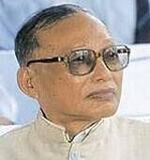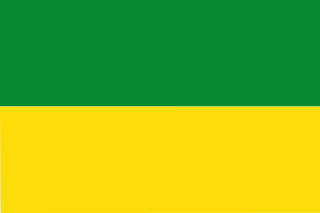
Ganamukti Parishad is a left-wing movement working amongst the Tripuri peoples of Tripura, in north-eastern India. It is affiliated with Communist Party of India (Marxist) as its tribal wing.

Tribal Youth Federation is an organization affiliated to Democratic Youth Federation of India in Tripura. TYF organizes youth from the tribal populations of the state. TYF has a separate central committee and publishes Bini Kharad. The supreme body of TYF is the Central Conference.

Kokborok (or Tripuri) is a Tibeto-Burman language of the Indian state of Tripura and neighbouring areas of Bangladesh. Its name comes from kók meaning "verbal" or "language" and borok meaning "people" or "human", It is one of the ancient languages of Northeast India.

Dasarth Debbarma was an Indian Communist politician in the Indian state of Tripura. He was chief minister of Tripura from 1993 to 1998. He was a leader of the Ganamukti Parishad and the Communist Party of India (Marxist). He was also the vice-president of All India Kisan Sabha and first and yet only Tiprasa chief minister of Tripura.

The Insurgency in Northeast India involves multiple separatist and jihadist militant groups operating in some of India's northeastern states, which are connected to the rest of India by the Siliguri Corridor, a strip of land as narrow as 14.29 miles (23.00 km) wide.

Kokborok (Tiprakok/Tripuri) is the native language of Tripuri people in present Tripura state in Northeast of India. During the 20th century many of Royal family and its officials contributes to develop the Kokborok language in many ways.
Drama was brought into the Kokborok-speaking population by the Yatra (Jatra) performers of Bengal. The rulers of Independent Tripura were the first to present and perform drama in Tripura. Though in the beginning the presentations of yatras (jatras) were limited to the Royal Compound, in course of time it came out of the royal compound and mass people also began to enjoy it and join it.
Sachindra Lal Singh was a leader of the Indian National Congress and the first Chief Minister of Tripura state in northeastern India from 1 July 1963 to 1 November 1971. In 1977, he became the leader of the newly formed Congress for Democracy party. He was elected to the sixth Lok Sabha from Tripura West constituency as a member of the congress for Democracy.Sachindralal Singh, the first Chief Minister of Tripura, was a highly popular leader of Tripura. He was fondly called “Sachin-da” and was highly admired for his simplicity and amiable nature.
Bidya Chandra Debbarma was a communist politician from the Indian state of Tripura. A prominent leader of the communist movement in Tripura, Debbarma spent a total of nine years in jail and 13 years as an underground activist. A six-time state assembly member and minister in the state government, Debbarma never lost any election he contested.

The Indigenous Peoples Front of Tripura (IPFT) is a regional political party in Tripura, India. It is a member of the National Democratic Alliance and North-East Democratic Alliance. The party was merged into the Indigenous Nationalist Party of Tripura (INPT) in 2001, However diverged out in 2009. The party is allied with BJP in the 2018 Tripura Legislative Assembly election and won eight seats out of eight contested seats. The party got 7.5% of the total votes polled. The BJP got 36 seats and with a total of 44 seats the BJP-IPFT coalition have two-thirds majority at the Legislative Assembly.
The politics of Tripura, a state in Northeast India, has been dominated by the Bharatiya Janata Party, the Communist Party of India (Marxist), the Indian National Congress, the Tipra Motha Party, the Indigenous People's Front of Tripura and the Trinamool Congress. As of 2020, the Bharatiya Janata Party is the ruling party in the states's legislative assembly and also won the two parliamentary constituencies in 2019 Indian general election.
Tripura Upajati Juba Samiti was a political party in the Indian state of Tripura from 1977–2001. During 1988-93, the Indian National Congress formed a coalition government with the TUJS at the Tripura Legislative Assembly.
The following is a list of political parties in the India
Birendra Chandra Dutta was an Indian communist politician. He founded the communist movement in Tripura. Dutta was a member of the 1st Lok Sabha, the 3rd Lok Sabha (1962–1967) and the 5th Lok Sabha (1971–1977).
Sudhanwa Debbarma was an Indian Kokborok writer, Political leader and member of the Communist Party of India (Marxist). He was the former Speaker of Tripura Legislative Assembly. He was the veteran leader of Ganamukti Parishad. He was a member of Tripura Legislative Assembly from Takarjala (1977-1988).

Tribal Students Union or TSU is a Student organisation of Tripura, it is affiliated to Students' Federation of India. The TSU is the student wing of the Communist Party of India (Marxist) in Tripura.

The Tipra Motha Party (TMP), also known as the Tipraha Indigenous Progressive Regional Alliance, is a regional political party and previously a social organisation in Tripura, India. The TIPRA is led by Pradyot Bikram Manikya Deb Barma. It is currently the second largest party in Tripura Legislative Assembly.
Dinesh Debbarma was a communist politician from the Indian state of Tripura. Debbarma first represented the party while standing in the 1977 Tripura Legislative Assembly elections. He won election three consecutive times from 1977 to 1993. He was minister for two terms in 1978 and 1983.
Harinath Debbarma is a Tipra-Indian politician, activist and statesman from Tripura. Harinath Debbarma founded the Tripura Upajati Juba Samiti (TUJS) in 1967 along with Shyama Charan Tripura. Later he founded the Indigenous People's Front of Tripura in 1997.
Anti-Bengali sentiment comprises negative attitudes and views on Bengalis. This sentiment is present in several parts of India: Gujarat, Bihar, Assam, and various tribal areas. etc. Issues include discrimination in inhabitation, other forms of discrimination, political reasons, government actions, anti-Bangladeshi sentiment, etc. The discriminative condition of Bengalis can be traced from Khoirabari massacre, Nellie massacre, Silapathar massacre, North Kamrup massacre, Goreswar massacre, Bongal Kheda, etc. This has led to emergence of Bengali sub-nationalism in India as a form of protest and formation of many pro-Bengali organisations in India.








